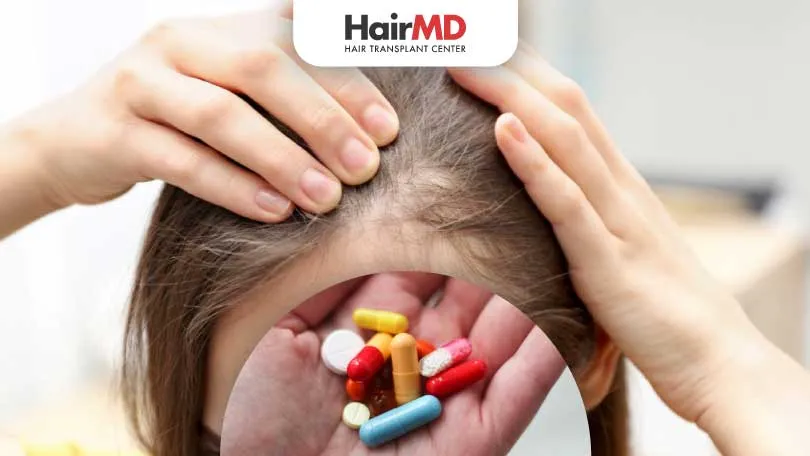23rd March, 2022

Discover common medications for hair loss, their effectiveness, and potential side effects. Learn how treatments like Minoxidil, Finasteride, and more can help promote hair growth.
Hair grows and eventually falls off and is replaced by new hair as part of its normal cycle. It’s typical to lose between 50 and 100 strands of hair a day. Since your hair thickness and the hairline usually remain the same, most people may not notice the natural hair loss that occurs on a daily basis. People are more likely to spot excessive hair loss, as seen by a lot of hair strands in hair brushes, pillows and clothes or showers. Some people may even notice reduced hair density over the scalp and balding as part of hair loss. This is usually a good time to take action as it may be due to an underlying condition.
Hair medication for treating hair loss issues slows thinning of the hair and increases coverage of the scalp by growing new hair. It also stiffens the shafts of your existing hair to grow thicker. With these medicines, hair density tends to increase on the top of the head and not on the forehead area.
People looking for a treatment to help prevent or regrow hair can find several potential hair loss medicines available in the market. The efficacy of each option will vary from person to person.
What’s covered in the article?
- What Are The Common Hair Loss Treatment Medicines Prescribed For Hair Loss?
- Conclusion
What Are The Common Hair Loss Treatment Medicines Prescribed For Hair Loss?
While your hair may regrow on its own, sometimes treatment is essential to prevent further hair loss. Several medications, helpful for preventing hair loss are available easily. The most common include:
Minoxidil
Minoxidil is among men and women’s go-to hair loss medicines for androgenetic alopecia. It comes in liquid, foam and gel forms. To use minoxidil, you need to apply it as directed, usually once or twice a day. When used as directed, minoxidil can stimulate hair growth, stop hair from getting thinner and prevent further hair loss.
Minoxidil comes in 5% and 2% solutions and is proven to be safe for most men and women. The 2% solution is the only hair loss treatment for women approved by the FDA. Minoxidil tends to be more effective when used along with other treatment options for hair loss.
Oral Finasteride
Finasteride is another hair loss treatment medicine that is effective for regrowing scalp hair, especially in males. This prescription hair medication affects the hormone testosterone reducing its effects on thinning follicles. The majority of men taking finasteride experience a slowing of hair loss, and some may show new hair growth. Like other hair loss medicines, this, too, takes time to work; it usually takes about 4 months to notice any improvement. During that while, you’ll need to keep taking it to retain any benefits.
Hair Growth Serums
Hair growth serums are designed to help your hair look thicker, denser, fuller, and healthier. They help improve blood flow to the scalp and give the appearance of hair density. The ingredients present in serums may help volumise, prevent thinning, and soothe a dry, itchy scalp. To use, simply massage a few drops into your scalp each night before bed.
Nutritional Supplements
Like any other part of your body, your hair, too, needs a variety of nutrients to be healthy and grow. Hair thrives on proteins, iron, zinc, and vitamin B12, D3 etc., which support hair structure and promote growth. Deficiency of these nutrients has been shown to cause hair growth. Hair supplements can go a long way in enhancing the hair follicle health. Your doctor may suggest a few tests to determine deficiency before putting you on specific nutrients or hair medications.
A few loose strands here and there can be considered as a part of a normal hair cycle, but if you notice sudden or excessive hair loss for more than 3 – 6 months, you should seek consultation with a hair doctor at HairMD. Our experienced dermatologist will recommend hair loss medicines after a thorough diagnosis of the cause of your hair loss.
Do You Know?
Nearly 250 Patients Visit HairMD
Everyday For Various Hair Concerns?
(Your journey to healthier and fuller hair starts here!)
Meet Our Dermatologists
Conclusion
Managing hair loss can be challenging, but with the right medical treatments, it’s possible to restore hair growth and regain confidence. Medications like Minoxidil and Finasteride offer effective solutions, but it’s important to consult with a healthcare professional to determine the most suitable option for your condition. Understanding the benefits and potential side effects of these treatments ensures you make an informed decision on your hair restoration journey. Remember, early intervention is key to preventing further hair loss and achieving the best results.
Further Reading
Top Kitchen Ingredients to Boost Hair Growth
Discover the best kitchen ingredients for hair growth! Use coconut oil, onion juice, aloe vera & more to nourish your hair naturally and reduce hair fall.
How to Treat Alopecia Areata at Home: Natural Solutions for Hair Growth
Explore home remedies for alopecia areata to promote hair regrowth and boost confidence from home.
Redensyl vs. Minoxidil: Which is the Better For Hair Growth?
Discover the differences between Redensyl and Minoxidil for hair growth. Learn about their effectiveness, side effects, and which treatment might be better for you.
Biotin-Rich Foods for Natural Hair Growth
Know the best foods rich in biotin to help your hair to grow naturally stronger and healthier by experts from HairMD, Pune
Have thoughts? Please let us know
We are committed not only to treating you, but also educating you.











